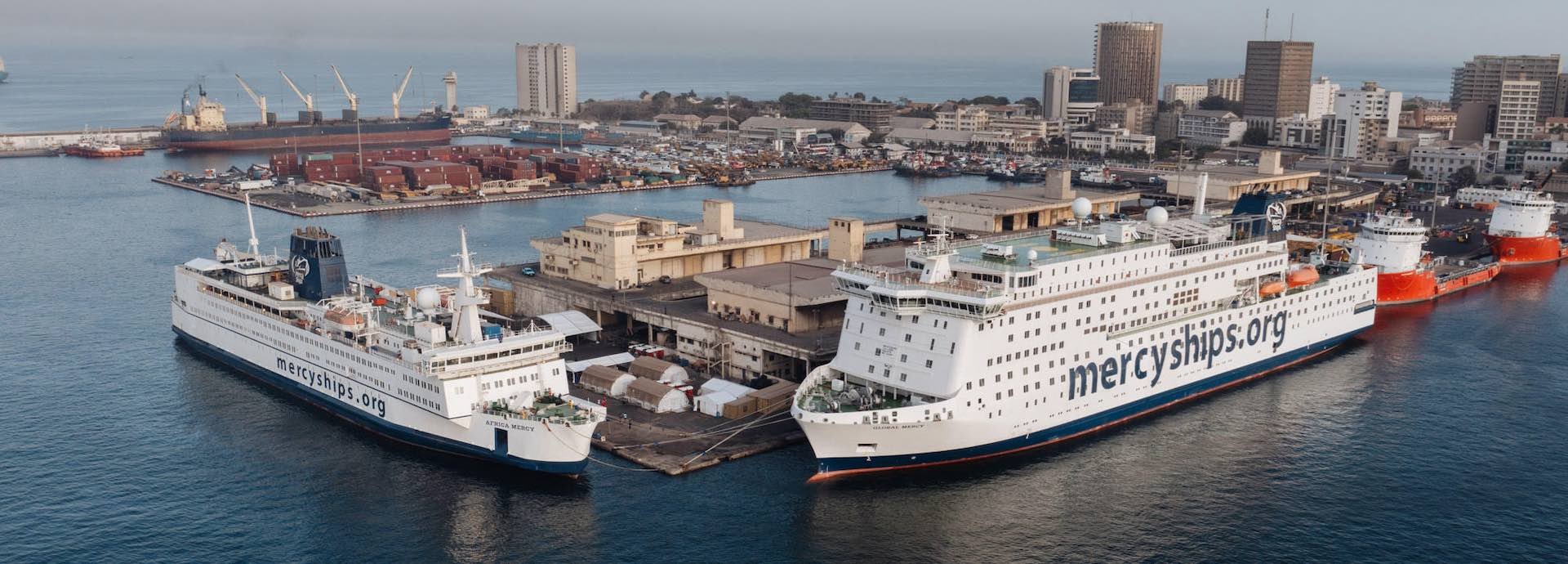

Around the globe, five billion people lack access to safe and affordable medical and surgical care. Since 1978, Mercy Ships, a philanthropic organisation, has been sailing the seas and providing world-class healthcare to people in developing countries, mainly in West Africa.
The latest addition to the Mercy Ships fleet, the Global Mercy, is a purpose-built hospital ship and the largest of its kind. It has six operating rooms, 200 patient beds, a laboratory, a CT-scanner, an x-ray machine, eye and dental clinics and a pharmacy.
Mercy Ships is an international charity that, in addition to surgeries and treatments, provides education and training to local healthcare providers in Africa. With the arrival of the Global Mercy, Mercy Ships’ capacity to provide free surgery and medical training has more than doubled.
Global Mercy and its older sister ship, the Africa Mercy, will allow the charity to perform more than 5,000 surgeries and 28,000 dental treatments each year while simultaneously allowing for the training of 2,800 medical professionals on board.
Our two eye surgery rooms onboard are equipped with everything you’d expect to find in Western hospitals, but not in West Africa. The surgery techniques onboard are different because we train using mostly old manual techniques that can be used in local hospital environments.
Built to serve
The Global Mercy set off on its first field service in Senegal at the beginning of 2023, and the plan is to continue the journey to Sierra Leone later in the autumn. With each field service expected to last ten months, crew members have a lot of preparation to do for the upgrade period.
After the ship arrived in Europe from China in September 2021 the hospital infrastructure and systems, such as additional electrical systems and oxygen supply, had to be installed. When the work was completed, the various systems had to be tested to ensure they worked as planned. Once everything was done, the hospital had to be thoroughly cleaned to comply with international cleanliness standards.
“Our two eye surgery rooms onboard are equipped with everything you’d expect to find in Western hospitals, but not in West Africa. The surgery techniques onboard are different because we train using mostly old manual techniques that can be used in local hospital environments. We use sterilised reusable surgical instruments and have disposable single-use supplies like gauze, cannulas, needles, bandages, etc.,” says Anneli Persson, Operating Room Ophthalmic Nurse and Team Leader on the Global Mercy.
The first patients arrived onboard in March 2023, and so far, more than 50 surgeries have already been done.
“The most important aspect from an engineering perspective is that we have to ensure the supply of stable and continuous power, water and ventilation to the hospital. We cannot afford interruptions as there are always lives at stake,” says Irik Mallie, Chief Engineer of Global Mercy.
The engine technology is of utmost importance on a ship like this, where life-changing surgeries are performed. The Wärtsilä engines are very smooth, quiet and create virtually no vibration.
Technology to the rescue
Helping in these stable operations are four Wärtsilä 32 engines, which are double resilient mounted and built to comply with the DNV’s VIBR classification, allowing the Global Mercy to have smooth running capabilities for critical activities like surgeries to be able to happen, keeping patient comfort and safety in mind.
“The engine technology is of utmost importance on a ship like this, where life-changing surgeries are performed. The Wärtsilä engines are very smooth, quiet and create virtually no vibration,” Mallie explains.
Additionally, the low maintenance Wärtsilä 32 engines run on ultra-low sulphur fuel allowing for low-exhaust emissions while in port. What’s more, it can run on a wide range of currently available fuels and will be able to run on environment friendly fuels currently in development, making it future proof.
The ship has a low carbon footprint in port as the ship has equipment that can process all generated waste, including medical waste, paper, plastic, sewage sludge, oil sludge etc.
“As well as people, we at Mercy Ships care about the environment of the countries we serve,” Mallie says.
On a mission
Global Mercy can accommodate 950 people when docked, including the ship’s 600 staff members – most of whom are volunteers. The staff is diverse, representing over 60 nations and all walks of life. The crew includes mariners, physicians, nurses, IT professionals, communications experts, chefs, and electricians. Most volunteers sign up to be on board for a period ranging from a few weeks to several months – but there is no set time limit, and everyone does what they can.
Ahead of docking in a new country, the ship’s advance crew goes scouting for patients and the best candidates for surgery. The entire process is done in close cooperation with the host country and local healthcare clinics – and state-level agreements are always sought before docking into a new country.
“Some children have been forced to take time off their schooling to look after sick family members, for example, and after surgery on their loved one, they have been able to return to school. These kinds of stories are very rewarding and spur us on to continue our work,” Persson says.
“We want to be as effective as possible with the medical care we offer, and our entire mission is dependent on the host country’s cooperation in order to make the field service successful,” adds Mallie.
Many people who are operated on have suffered from painful, disfiguring and debilitating – and often-preventable diseases and conditions. Mercy Ships’ work makes an enduring impact on countless lives, thereby demonstrating that one organisation can make monumental change touching the lives of patients, their families, and the whole community.
Did you like this? Subscribe to Insights updates!
Once every six weeks, you will get the top picks – the latest and the greatest pieces – from this Insights channel by email.


